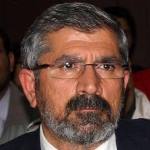Turkey: Tahir Elci death must be investigated amid questions over rule of law
LIEMERTJE SIEDERS
Ongoing obscurity surrounding the death of a prominent human rights lawyer in Turkey in November continues to raise questions about the country’s ability to uphold the rule of law.
A Kurdish lawyer and chairman of the Diyarbakir Bar Association, Tahir Elci was shot dead on November 28 during a press conference in Turkey’s south-eastern city of Diyarbakir. He had been making an appeal for peace in the city, which has been the scene of months of violent clashes between Turkish security forces and members of Kurdish rebel group PKK.
|

|
|
Tahir Elci |
Thousands flocked to Elci’s funeral a day later, but three months on the investigation into his death has yielded no results and violence between Kurds and Turkish forces continues to worsen.
Justice Richard Goldstone, honorary president of the International Bar Association's Human Rights Institute (IBAHRI), calls for a transparent and effective investigation into Elci’s death: ‘I join in the call for a thorough investigation into the death of Tahir Elci. It is in the interests of the Government of Turkey to do so.’
Throughout his career, Elci fought to impartially represent victims of violence and violations at the hands of Turkish security forces. He took several cases to domestic courts across the country, and when remedies were unattainable domestically, he appealed to international mechanisms, successfully representing numerous applicants before the European Court of Human Rights in their claims against Turkey.
A memorial event for Tahir Elci took place in London on 27 January, almost two months to the day since the Kurdish lawyer was killed. As noted during the memorial, which was hosted by Amnesty International, Turkey did not have room for the strength of Elci’s voice and several attempts were made to suppress it.
The threats to his safety reached an unprecedented level when he appeared on the CNNTurk show ‘Neutral Zone’ and stated, amongst other things, that ‘the PKK is not a terrorist organisation’. These words provoked a systematic and retaliatory hate campaign which associated Elci with his client’s cause and beliefs.
‘‘The situation in Turkey is extremely troubling, making the tragedy of Elci’s death all the more serious
Hans Corell, IBAHRI Co-Chair
He was charged with making terrorist propaganda, was briefly detained and began receiving death threats. A few weeks later, while holding making a speech calling for the cessation of violence and for the protection of cultural heritage sites, Elci was shot dead. With tragic irony, as one audience member pointed out during the memorial, ‘Elci died with the call for peace on his lips.’
Elci’s death was a loss not only to the legal profession but also to the country as a whole. Tony Fisher, Chair of the Law Society of England and Wales' Human Rights Committee and a speaker in the panel discussion held during the memorial, spoke of Elci’s ‘inventiveness and flexibility’ as a lawyer and of his ‘objectivity’.
Turkish lawyer and human rights activist Orhan Kemal Cengiz told of Elci’s relentlessness and how he followed through with cases no matter where they were sent: ‘When I had asked Elci how he dealt with his work psychologically, he responded that his work did traumatise him, but it was only by taking the cases to the courts that he felt rehabilitated from his trauma.’
Baroness Helena Kennedy QC, Co-Chair of the IBAHRI, told Global Insight that ‘Elci spoke for the best of lawyering and showed that lawyers are not just out there seeking remuneration, but are trying to secure justice.’
Elci’s professional achievements, however, as Amnesty International’s Turkey researcher Andrew Gardner noted, constituted only ‘a fraction of who he was’. The memorial’s emphasis on Elci’s warmth and kindness made it clear that his death marked the loss of not only an esteemed lawyer, but also a valued friend.
For some, Elci’s death leaves a question mark hovering over the future of Turkey as to whether it will support or turn away from the rule of law. This uncertainty has been exacerbated by the prevailing atmosphere in Turkey, according to Hans Corell, Co-Chair of the IBAHRI. ‘The situation in Turkey is extremely troubling, making the tragedy of Elci’s death all the more serious,’ he says.
Despite this grim picture, Kennedy believes that, in time, courage will be restored and voices of dissent will gain strength once more. ‘With his death,’ she says, ‘the baton is being passed onto other lawyers.’ One need only look to Elci’s wife, who despite her sorrow and risks to her own safety, attended the tribute to ensure the voice of her late husband would continue to be heard.
Fisher concluded with a powerful message: ‘The odds are stacked against it. But the odds were always stacked against Tahir Elci. We owe it to him to do something.’
Kennedy stresses the need for governments across Europe to use what power they have to stop this cycle of impunity in Turkey. Goldstone also highlighted the importance of protecting lawyers like Elci across the world who put their lives at risk on a daily basis in order to uphold the rule of law: ‘Human rights lawyers in violent regions of the world courageously defend those less popular with governmental authorities. It is often calculated to dissuade other lawyers from undertaking that kind of work.’
Liemertje Sieders is a former intern at the IBAHRI and started a traineeship at the Council of Europe in March 2016. She can be contacted on liemsieders@gmail.com